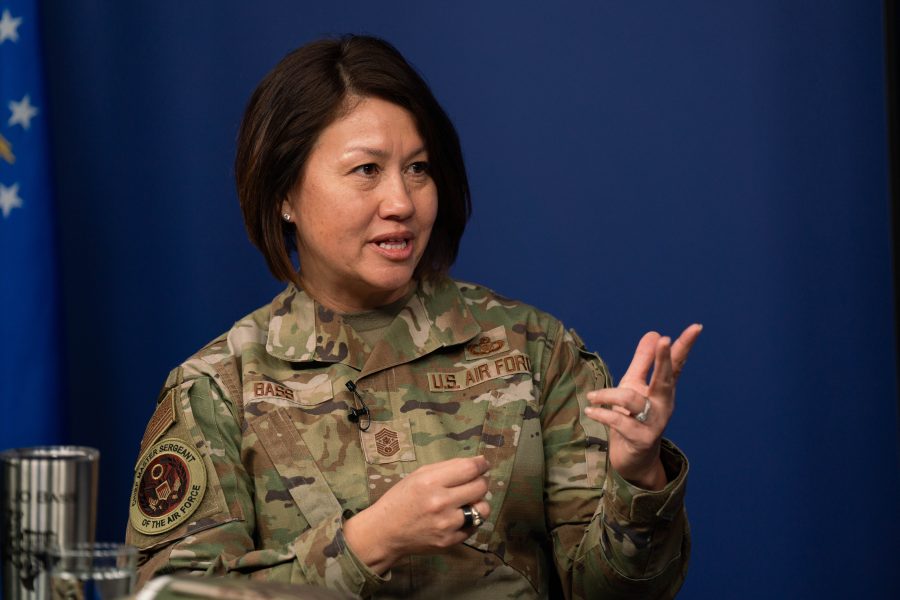Pay and compensation is top of mind for Chief Master Sergeant of the Air Force JoAnne S. Bass as she enters the final two months of her tenure as the service’s 19th top enlisted Airman. The Air Force’s current models and policies for determining pay and compensation are outdated and must be reformed to attract top talent in the technical skill sets that the future Air Force will need, she said.
“Nobody joins the military to get rich, but they have to be compensated appropriately,” Bass said Jan. 4 in a livestreamed discussion with Air & Space Forces Association president and CEO retired Lt. Gen. Bruce “Orville” Wright.
“If you look at today’s pay and compensation model, specifically the pay chart, it really hasn’t evolved since 1949,” she added.
In particular, Bass suggested new mechanisms may be required to attract technical specialists who may be overqualified for the junior enlisted ranks at which most Airmen begin their careers.
“If you grab someone who’s 28 years old and they already have all of the certifications in the skill that we’re going to do, we’ve got to give them some profession of arms training and skill sets. But do they come in as an E-1 or E-2 or E-3? I don’t know,” she said.
The Air Force has a working group analyzing those ideas and others related to quality of life in the service, such as health care and child care. Bass’ comments come about halfway through the two-year 14th Quadrennial Review of Military Compensation, where the Department of Defense checks to make sure service members’ pay, benefits, and allowances keep up with socioeconomic changes.
“Today’s military family looks different than it did 30 years ago,” Bass said. “You have more dual-working parents, more dual-military parents, more single parents.”
Those social changes coincide with rising prices for housing and basic needs which are straining the wallets of many Airmen around the world. Bass and other senior Air Force leaders have stated in the past that the military needs a better way to keep up with inflation and balance personnel pay with modernization.
Bass suggested that “unconstrained” out-of-the-box thinking may be required to achieve those goals and keep pace with civilian jobs. Even fast food restaurants and national chain retail stores provide health and dental care today for entry-level employees, she said, which means the Air Force has to offer a competitive package.
“Again … nobody joins the military to get rich, at least I don’t think so. But we can’t be too far off when it comes to what is being offered in the economy today in America,” she added.
More specifics may be available at the AFA Warfare Symposium from Feb. 12-14, where senior leaders will also share more details on the Air Force-wide effort to optimize the force for near-peer conflict, Bass said.
Besides compensation, Bass also emphasized child care and health care as key areas in need of modernization. The need for child care facilities today is stronger than it was several decades ago because there are more dual-working parents and dual-military parents. However, military facilities and their civilian counterparts have a hard time attracting providers, especially considering the odd hours that military parents often have to work.
Bass acknowledged that Air Force base commanders “are doing phenomenal things” to address child care needs at a local level. Overall, child care capacity has increased over the past year, there are more family child care providers and fewer families on waiting lists, she said.
“But we’ve got to take a look as a Department of Defense at ‘how do we increase the capacity even more so that our service members can focus on the mission and know that their children will be taken care of?’”
The CMSAF plans on discussing these and other quality of life issues with lawmakers later this month as she and other senior military enlisted leaders press for more support for child development centers, youth centers, and other personnel programs.
“We’ve made a promise to America’s moms and dads that if your son or daughter joins the military, we will provide a roof over their head, we will feed them, we will take care of our national treasures,” Bass said. “And that starts with pay and compensation, health care, child care, all of those.”
